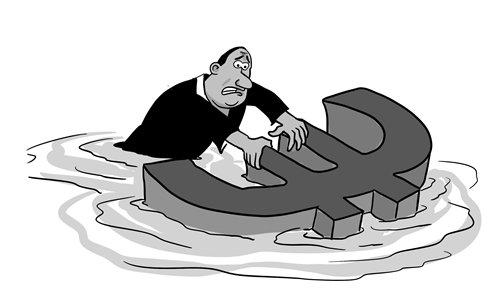HOME >> BUSINESS
Italy’s predicament may pose new risk to eurozone
Source:Global Times Published: 2019/7/1 18:18:39

Illustration: Luo Xuan/GT
The Brexit dilemma may have been the most eye-catching issue in the European market. However, Brexit is no longer the priority for Europe, but a problem it needs to resolve as soon as possible. Europe has more important issues to deal with; primarily to maintain the EU's stability, the eurozone's integrity, and the steadiness of the euro.
During the European debt crisis, the five European countries that received bailout loans highlighted the weakness of eurozone countries. At that time, there was a high possibility that Greece, with its poor fiscal management, would have to leave the EU. After years of struggle, Greece was able to stay afloat with the help of the rest of the eurozone. And now Italy, the third largest economy in the eurozone, is caught in an economic downturn and a heavy debt burden.
A massive debt pile is the major problem facing the Italian economy. Currently, Italy's public debt is around 2.3 trillion euros ($2.62 trillion), equivalent to 132 percent of Italy's GDP and far above the 60 percent EU ceiling. Due to the country's deteriorating deficit, the European Commission recently recommended starting disciplinary proceedings against Italy which may result in a fine of up to 0.2 percent of GDP, that is, around 3.5 billion euros.
Italy's crisis is different to that of Greece. Italy's GDP accounts for 15.4 percent of the eurozone total, bested only by Germany (29.2 percent) and France (20.5 percent). So its economic downturn or recovery has a great impact on the eurozone economy and the euro's performance. High public debt and an economic downturn have been around for years in Italy. Since the nation has no right to formulate its own monetary policy in the eurozone, the single currency area, it can only rely on its fiscal policy to stimulate the economy. However, its expansionary fiscal policy also faces economic and political limitations. On the economic front, an expansionary fiscal policy may increase government debt, causing Italy to fall into another debt crisis. On the political front, after the European debt crisis, the EU policies placed a lot of emphasis on fiscal discipline, urging member states to tighten fiscal spending and cut the fiscal deficit.
Tensions between the populist-led Italian government and the EU have risen amid the fiscal pressure and debt problems. In 2018, Five Star and the League parties formed a governing coalition after the election. Since both parties advocate an expansionary fiscal policy, the uncertainty of the Italian economy has increased, so has the conflict with the EU. Claudio Borghi, Lega chairman of Italy's lower house budget committee, said, in early June, that the government will take a tough line in budget talks with the European Commission and negotiations must not end as they did last autumn. In order to alleviate its debt pressure, the Italian government is reportedly considering a proposal that would see the treasury issue mini-BOTs, namely short-term treasury bills, which could be used by recipients to pay taxes or to buy goods or services from state-owned companies. In terms of its payment function, the mini-BOTs could be seen as a parallel currency. Supporters of the idea believe the short-term securities would help the government reduce its outstanding bills, while critics say it would lead to higher public debt in a country that already has the second largest debt pile in the eurozone.
The mini-BOTs are not just related to Italy's financing capability or to its sovereign debt problem, but actually point to Italy's questioning of the eurozone. In fact, discussions surrounding Italy's severe debt problem have once again triggered concerns over its commitment to a single currency. Prior to the 2018 election, Five Star and the League parties had already expressed doubts over the impact of Italy joining the eurozone. Erik Nielsen, group chief economist at UniCredit, was quoted by CNBC as saying that "There are a number of economists, including influential ones close to the Italian government, who believe the euro is a key reason for Italian underperformance, and the leaders of the coalition have never fully put this idea to bed."
The idea of issuing the mini-BOTs has also caused dissatisfaction among some European countries and organizations. Mario Draghi, head of the European Central Bank, said that "Mini-BOTs are either money and then they are illegal, or they are debt and then the stock of debt goes up."
Under the current circumstances, it is difficult for Italy to get rid of the economic downturn and high debt at the same time. Italy can hardly comply with the fiscal rules of the eurozone, but if its debt sees further expansion, it may risk its economic stability and sustainability. If the predicament continues, it will be hard for the country to stay in the eurozone.
The article was compiled based on a report by Beijing-based private strategic think tank Anbound. bizopinion@globaltimes.com.cn
Posted in: INSIDER'S EYE